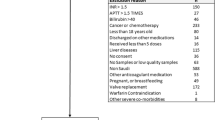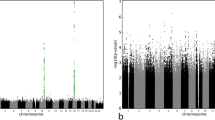Abstract
Purpose
To explore the pharmacogenomics of warfarin using the extreme-discordant-phenotype (EDP) methodology.
Methods
The target phenotype was the stable warfarin dose prescribed to 353 patients. Pharmacogenetic polymorphisms assessed were coagulation factor VII (FVII) -401G>T and FVII -402G>A, VKORC1 3673G>A, and CYP2C9*2, *3, *5, and *11 alleles. The EDP analyses contrasted the frequencies of these polymorphisms at different cutoff points (5th through 30th percentiles of the warfarin dose distribution) at opposite ends of the warfarin dose distribution.
Results
Significant differences existed in FVII -402G>A genotype frequency at the 5th percentile with an over-representation of the wildtype GG genotype at low warfarin doses and in VKORC1 3673G>A and CYP2C9 polymorphisms at all cutoff points where the variant alleles were overrepresented at low warfarin doses.
Conclusion
The EDP methodology provides increased statistical power for detection of small contributions of genetic polymorphisms to multiplex drug-response phenotypes, such as warfarin dose requirement for adequate anticoagulation.

Similar content being viewed by others
References
Sconce EA, Khan TI, Wynne HA et al (2005) The impact of CYP2C9 and VKORC1 genetic polymorphism and patient characteristics upon warfarin dose requirements: proposal for a new dosing regimen. Blood 106(7):2329–2333
Wadelius M, Chen LY, Downes K et al (2005) Common VKORC1 and GGCX polymorphisms associated with warfarin dose. Pharmacogenomics J 5(4):262–270
Aquilante CL, Langaee TY, Lopez LM et al (2006) Influence of coagulation factor, vitamin K epoxide reductase complex subunit 1, and cytochrome P450 2C9 gene polymorphisms on warfarin dose requirements. Clin Pharmacol Ther 79(4):291–302
Takahashi H, Wilkinson GR, Nutescu EA et al (2006) Different contributions of polymorphisms in VKORC1 and CYP2C9 to intra- and inter-population differences in maintenance dose of warfarin in Japanese, Caucasians and African-Americans.Pharmacogenet Genomics 16(2):101-110
Caldwell MD, Berg RL, Zhang KQ et al (2007) Evaluation of genetic factors for warfarin dose prediction. Clin Med Res 5(1):8–16
Gage BF, Eby C, Johnson JA et al (2008) Use of pharmacogenetic and clinical factors to predict the therapeutic dose of warfarin. Clin Pharmacol Ther 84(3):326–331
Michaud V, Vanier MC, Brouillette D et al (2008) Combination of phenotype assessments and CYP2C9-VKORC1 polymorphisms in the determination of warfarin dose requirements in heavily medicated patients. Clin Pharmacol Ther 83(5):740–748
Perini JA, Struchiner CJ, Silva-Assunção E et al (2008) Pharmacogenetics of warfarin: development of a dosing algorithm for Brazilian patients. Clin Pharmacol Ther 84(6):722–728
International Warfarin Pharmacogentics Consortium (2009) Warfarin dosing using clinical and pharmacogenetic data. New Engl J Med 360(8):753–764
Suarez-Kurtz G, Perini JA, Silva-Assunção E, Struchiner CJ (2009) Relative contribution of VKORC1, CYP2C9 and INR response to warfarin stable dose. Blood (in press)
Tham LS, Goh BC, Nafziger A et al (2006) A warfarin-dosing model in Asians that uses single-nucleotide polymorphisms in vitamin K epoxide reductase complex and cytochrome P450 2C9. Clin Pharmacol Ther 80(4):346–355
Borgiani P, Ciccacci C, Forte V et al (2009) CYP4F2 genetic variant (rs2108622) significantly contributes to warfarin dosing variability in the Italian population. Pharmacogenomics 10(2):261-266
Kim HS, Lee SS, Oh M, Jang YJ et al (2009) Effect of CYP2C9 and VKORC1 genotypes on early-phase and steady-state warfarin dosing in Korean patients with mechanical heart valve replacement. Pharmacogenet Genomics 19(2):103–112
Wadelius M, Chen JD LY, Lindh N et al (2009) The largest prospective warfarin-treated cohort supports genetic forecasting. Blood 113(4):784–792
Cooper GM, Johnson JA, Langaee TY et al (2008) A genome-wide scan for common genetic variants with a large influence on warfarin maintenance dose. Blood 112(4):1022–1027
Takeuchi F, McGinnis R, Bourgeois S et al (2009) A genome-wide association study confirms VKORC1, CYP2C9 and CYP4F2 as principal genetic determinants of warfarin dose. PLoS Genetics 5(3):e1000433
Nebert DW (2000) Extreme discordant phenotype methodology: an intuitive approach to clinical pharmacogenetics. Eur J Pharmacol 410(2–3):107–120
Zhang G, Nebert DW, Chakraborty R et al (2006) Statistical power of association using the extreme discordant phenotype design. Pharmacogenet Genomics 16(6):401–413
Shikata E, Ieiri I, Ishiguro S et al (2004) Association of pharmacokinetic (CYP2C9) and pharmacodynamic (factors II, VII, IX, and X; proteins S and C; and gamma-glutamyl carboxylase) gene variants with warfarin sensitivity. Blood 103(7):2630–2635
D’Ambrosio RL, D’Andrea G, Cappucci F et al (2004) Polymorphisms in factor II and factor VII genes modulate oral anticoagulation with warfarin. Haematologica 89(12):1510–1516
Herman D, Peternel P, Stegnar M et al (2006) The influence of sequence variations in factor VII, gamma-glutamyl carboxylase and vitamin K epoxide reductase complex genes on warfarin dose requirement. Thromb Haemost 95(5):782–787
Schelleman H, Chen J, Chen Z et al (2008) Dosing algorithms to predict warfarin maintenance dose in Caucasians and African Americans. Clin Pharmacol Ther 84(3):332–339
Evans DA, Manley KA, McKusick VA (1960) Genetic control of isoniazid metabolism in man. Br Med J 2(5197):485–491
Idle JR, Smith RL (1979) Polymorphisms of oxidation at carbon centers of drugs and their clinical significance. Drug Metab Rev 9(2):301–317
Gonzalez FJ, Skoda RC, Kimura S et al (1988) Characterization of the common genetic defect in humans deficient in debrisoquine metabolism. Nature 331(6155):442–446
van’t Hooft FM, Silveira A, Tornvall P et al (1999) Two common functional polymorphisms in the promoter region of the coagulation factor VII gene determining plasma factor VII activity and mass concentration. Blood 93(10):3432–3441
Acknowledgements
This work was supported by grants from Conselho Nacional de Desenvolvimento Científico e Tecnológico (CNPq), Coordenação de Aperfeiçoamento de Pessoal de Nivel Superior (Capes) and Financiadora de Estudos e Projetos (Finep).
Author information
Authors and Affiliations
Corresponding author
Rights and permissions
About this article
Cite this article
Fuchshuber-Moraes, M., Perini, J.A., Rosskopf, D. et al. Exploring warfarin pharmacogenomics with the extreme-discordant-phenotype methodology: impact of FVII polymorphisms on stable anticoagulation with warfarin. Eur J Clin Pharmacol 65, 789–793 (2009). https://doi.org/10.1007/s00228-009-0651-6
Received:
Accepted:
Published:
Issue Date:
DOI: https://doi.org/10.1007/s00228-009-0651-6




